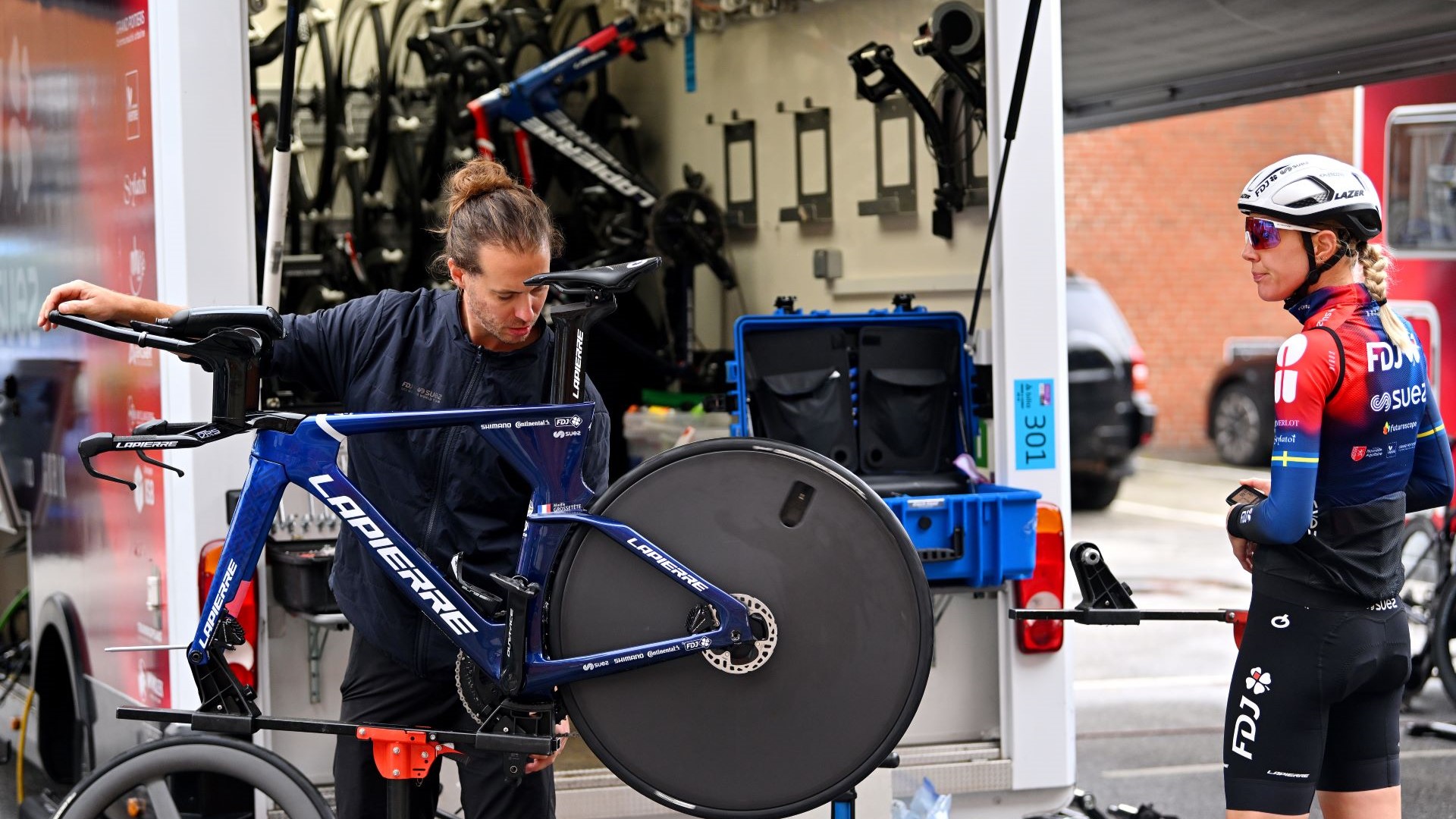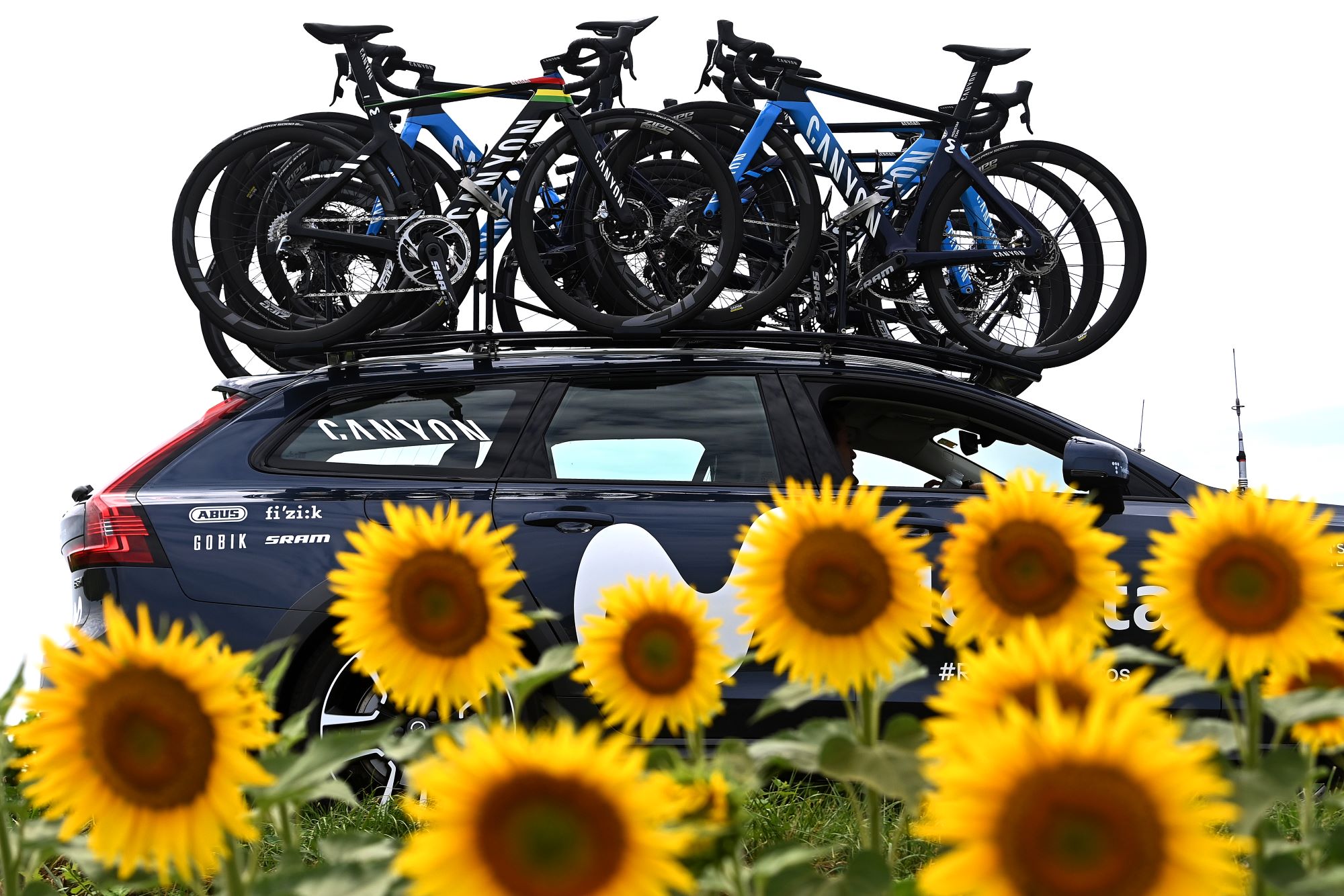
The second day of racing at the Tour de France Femmes avec Zwift featured a rare split stage, which hadn’t been seen at the Tour de France since 1991. The peloton faced a challenging double-header consisting of a short, flat 67-kilometer road race in the morning, followed by a 6.3-kilometer time trial in the afternoon.
Reviving a once-popular tradition, the split stage doubled the excitement for spectators but proved less popular with the riders. The day felt like a revolving door of pre-race preparations, outfit changes, warm-ups, cool-downs, refuelling, and refocusing — turning the race into a mental challenge as well as a physical one.
Racing two events in one day is undeniably taxing for the riders, but they aren’t the only ones pulling double duty. Even a race as brief as 7 minutes demands specialised time trial bikes and equipment. Transporting this extra gear across three countries required additional vehicles, increased storage at hotels, and extra mechanic hours for setup and maintenance. Cycling Weekly took a peek behind the scenes to see what the day looked like for the hardest-working people of the tour: the race mechanics.
30 bikes and counting

The Tour de France Femmes is contested by 22 teams, each with 7 riders. Each rider needed at least two bikes –a road bike and a time trial bike– to complete the second day of racing, but far more equipment was being transported, prepped and cleaned than that.
While the exact amount of equipment varied based on a team’s budget and sponsors, on average, most teams at the Tour de France Femmes have:
- 3 road bikes per rider
-1 time trial bike per rider
-1 spare time trial bike for the leader(s)
- 50-80 wheels in total
Lucas Fouquet, a mechanic at FDJ-Suez, told Cycling Weekly that he and the three other mechanics prepped and cleaned 35 bikes on Tuesday alone. To accommodate the quick turnaround between the two stages, the team added a fourth mechanic just for the day. In addition to lending an extra hand, the mechanic would take the time trial wheels back to the Service Course in the evening. The bikes, however, would stay in the extra truck throughout the Tour, and double as an extra logistic car for luggage, water, etc, Fouquet said.
It’s a lot of work for a race that doesn’t even last 10 minutes, Fouquet agreed.
“It’s better to have one day just for the time trial,” he said. “It was a bit messy for the teams [in between the stages]. We had a lot going on.”
The day started like any other race day. The road bikes had been put away clean the night before, but even so, they got a once-over to ensure each rider's bike was perfectly tuned to the rider’s specific preferences and the day's race conditions. All the gear was then loaded onto the trucks and follow cars and driven to the start of the first race in Dordrecht. Here, the smart trainers are set up for the riders to do their warm-up, and spare wheels are divvied up across the support vehicles.
Some of the mechanics will be in the support vehicle, ready to replace a wheel, swap a bike or fix any issues that may arise during the race. The remaining mechanics helped pack up and transfer the non-support vehicles to the finish.
Once in Rotterdam, it was all hands on deck for the mechanics. Trainers were again set up for the riders’ cool down while the bikes used in the first stage had to get meticulously cleaned and prepped for the following day. The team also travelled to the hotel so riders could eat and shower before returning to the centre of Rotterdam for a recon of the time trial course. This meant that the time trial bikes had to be prepared for the recon and looked over again afterwards, ensuring they were race-ready. Before the race, the trainers were set out yet again for a warm-up and post-race cool-down. During the race, mechanics took turns accompanying individual riders in follow cars.
One of their top riders, the newly crowned Olympic time trial champion Grace Brown, got a third time trial bike for the Tour—a last-minute golden addition to honour her Olympic achievement. Unfortunately, Brown suffered a flat tyre during the time trial and had to finish the race on her spare bike (painted in the green and yellow colours of the Australian champion), losing significant time during the bike swap.
Post-race, the mechanics cleaned the time trial bikes as the riders returned from their individual efforts, putting them away clean and ready for a future race.
“For sure, these are busy days,” commented Luka Riva, Ceratizit - WNT Procycling Team mechanic. “It’s the beginning of the Tour de France and there is a lot of stress also for us, the mechanics.”
Riva said the first two stages were tense in the peloton, leading to more crashes than usual, which also adds work for the mechanics.
“We always have to be ready for everything,” he said.
His team carried 21 road bikes and 8 time trial bikes. In case of a crash in the time trial, the team’s General Classification leaders would have gotten a spare bike, and all other riders would have received either a spare wheel or a road bike to finish the race on.
“For the mechanics, it’s hard,” the mechanic of St. Michel Mavic-Auber93 said about a split stage. “We’re not used to it at this level. In amateur racing, it’s pretty common but they only have two bikes - one road, one time trial bike.”
The St. Michel crew only had three mechanics for the day, one of whom had a long evening in store, tasked with dropping off the time trial wheels to free up some space before rejoining the race in Valkenburg for the start of Stage 4.
“It’s a lot but, you know, it’s the Tour de France so we have to do it.”







